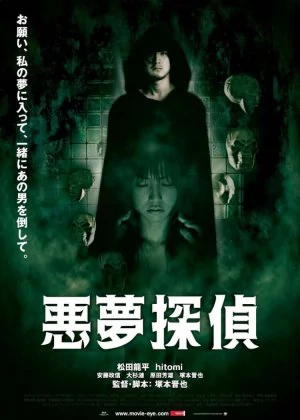Nightmare Detective
If you're looking for an easier entry into Shinya Tsukamoto's oeuvre, Nightmare Detective [Akumu Tantei] is it. It's one of the few films where he doesn't dissect an entire genre just to reassemble it and make it his own. Nightmare Detective is a horror film with recognizable traces of J-Horror scattered left and right. On the other hand, 85% Tsukamoto is still a whole lot of manic, in your face craziness that should probably be approached with caution, especially when you're not all too familiar with his other films.

When Nightmare Detective was first released, people were a little too quick and eager to label the film as part of the J-Horror wave. Sure enough, the digital look might have tricked some and the larger focus on plot was a clear departure from earlier Tsukamoto films, but there are no long-haired ghosts, no classic scares and no grudges or revenge-themed plots. Instead Tsukamoto made things a bit more mysterious and fantastical, carving out his own niche in the genre.
The story about a mysterious phone call seemingly killing people triggered another false positive (Takashi Miike's Chakushin Ari [One Missed Call] was quite popular back then), others tried to link the dream aspect of the killings to the Nightmare on Elm Street series. While those references are factually correct, Nightmare Detective as a whole has little to do with those films. The psychological and dramatic angles weigh much harder on the film, letting it transcend the horror genre.
The story is told from Keiko's point of view, a police young but accomplished detective. Transferring from a desk job, the suicide of a young 20-year-old is her first assignment in the field. When a second suicide turns up not much later, they discover that both victims killed themselves in their sleep. Hitting a dead end, Keiko's last resort is to contact Kagenuma, a young boy rumoured to be able to enter people's dreams. Convincing him to do so isn't that easy though, as Kagenuma considers his gift more a burden than a blessing.

While definitely not as crazy and extreme as Tsukamoto's older work, Nightmare Detective still carries clear markings of his trademark style. The dream attacks are filmed from up close by a camera that tries to bolt in all directions at once, while the ending has plenty of semi-abstract imagery. The rest of the film looks pretty great too, but never as outspoken compared to what he did in the past. I also remembered it as being a little grainier, but that might just be me spending the past 10 years getting used to the DV look.
The soundtrack follows the same toned-down pattern. Chu Ishikawa is still allowed to go completely wild during the dream-induced attacks, but the rest of the score is pretty timid for his doing. Again, it's definitely not a bad score, there are some very nice, moody tracks that invoke exactly the right atmosphere, it's just that it's way more accessibly than Ishikawa's earlier work.
Main attraction on the actor's list is without a doubt Ryuhei Matsuda. His part is actually quite limited, both in duration as in reach, but it's always a pleasure to see him appear on screen. Leading lady Hitomi does a decent enough job too, some well-known names (Ren Osugi, Masanobu Ando, Tsukamoto himself) in supportive roles round off a solid cast. The acting is nothing too out of the ordinary, but it more than meets the requirements for a film like this.

While the first part of the film is more horror-oriented, things get a bit more mysterious when Matsuda's character is introduced. The dream sequences aren't as abstract as you may expect from a Tsukamoto film, but slowly the horror aspect of the film is replaced with a darker, more intricate layer of mystery. It all builds up to a very gratifying finale, but it's just too little, too late for Nightmare Detective to be counted as one of the best Tsukamoto films.
It's still a great film though. Even a slightly watered down Tsukamoto film is way better than most of the J-Horror films released in the past 15 years. In that sense, Nightmare Detective is a great introduction to Tsukamoto's films for people not familiar with his work. It gives you enough slices of trademark Tsukamoto madness in order to get a feel for his work, but it also leaves enough traditional horror fun for the rest. Nightmare Detective may not be one for the ages, but it's still a superb diversion to pass the time.
